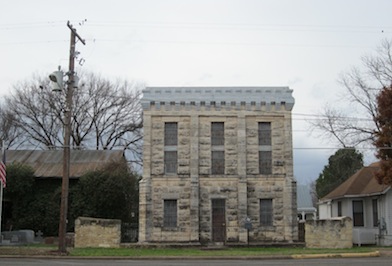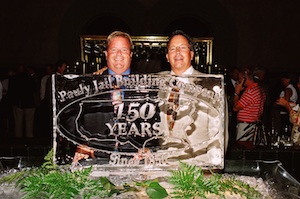First Families: Portable Wagon Jails
 The frontier of the Mississippi River attracted some flinty, entrepreneurial characters on the eve of the Civil War, including steamboat pilot Mark Twain, who wrote, “It is a strange study, a singular phenomenon, if you please, that the only real, independent, and genuine gentlemen in the world go quietly up and down the Mississippi River, asking no homage of any one, seeking no popularity, no notoriety, and not caring a damn whether school keeps or not.”
The frontier of the Mississippi River attracted some flinty, entrepreneurial characters on the eve of the Civil War, including steamboat pilot Mark Twain, who wrote, “It is a strange study, a singular phenomenon, if you please, that the only real, independent, and genuine gentlemen in the world go quietly up and down the Mississippi River, asking no homage of any one, seeking no popularity, no notoriety, and not caring a damn whether school keeps or not.”
He easily could have been writing about P.J. Pauly, a St. Louis-based blacksmith who worked on the river’s vessels during that era. By 1856, Pauly was gaining widespread attention for his steel cages mounted to flatbed wagons: portable jails.
“Even dating back to the 1700s, from what we can tell, the Pauly family was working in the iron business,” says Joseph Pauly Pohrer III, great-great-great grandson of P.J. Pauly and current president of Pauly Jail Building Company Inc., which has offices in St. Louis, Florida, and Indiana. “When the shipping and barge-building business slowed down, they started focusing on jails. My family built one of the first iron cages on the back of a wagon so long ago that it used this archaic, gothic spelling for jail — gaol. Over time the name ‘Pauly’ came to be associated with a high quality of traditional jail and prison construction throughout the United States.”
From those old-school “gaols” to Securidor, the forerunner of the heavy hollow metal door and frame, the Paulys continued to transform their industry. Pohrer name-checks a list of innovations and contributions: double-ribbed bar and the development of the “tool-resisting steel” with the Crucible Steel Company; toilets and other plumbing fixtures that resist clogging; the first “steel cells” in the form of crank-operated “squirrel cages” — of which there are still 13 in use, Pohrer says.
In the 1960s, the company faced a crisis with its stocks and voting shares and ended up closing its doors and selling off assets and patents, leading to the sale of the copyright of the Pauly company name. Pohrer’s father, though, continued to work in the detention industry with hopes that his heirs would reclaim the brand and rebuild the family business.
“I always knew we’d come back to work for our dad,” says Pohrer. “Back then, there wasn’t much of a company left to go back to, and my friends all said things like, ‘You’re college-educated – why do you want to build jails?’ I would say, ‘You don’t understand. I want to carry on the family name. This is a family legacy and a tradition I’m proud of.’”
So Pohrer and his younger brother, Robert, both with business degrees from the University of Kentucky, returned to St. Louis in the 1980s as the fifth generation of their clan to tackle the nuts and bolts of criminal justice facilities. “After all my parents had done for us, we felt we owed it to them,” says Robert Pohrer, who now is CEO of the company.
In 1991, they took back legal rights to the name, and set about growing the company. Erford Harrison, who has worked for Habersham Metal and currently serves as a consultant for SteelCell in north Georgia, was one of the first vendors to extend a line of credit to the new incarnation of Pauly Jail Building.
“I knew they were good for it — just had a feeling about them — and I was right,” Harrison said. “They’ve paid me back a thousand times over, and they’ve proved to be one of the most loyal and dependable companies in the country. I’ve never heard of them doing any kind of bid-shopping.”
 The Pohrer brothers oversee an office with a staff of 14, plus 10 superintendents. “Unlike other companies in this industry, we do not use subcontractors,” says Joe Pohrer, who devised the Complete Bid Listing Form, which compiles all of the key manufacturers and DECs and is used by specialists across the industry. He also developed the National Training and Educational Seminar for correctional projects, a first-of-its-kind program that now reaches four states.
The Pohrer brothers oversee an office with a staff of 14, plus 10 superintendents. “Unlike other companies in this industry, we do not use subcontractors,” says Joe Pohrer, who devised the Complete Bid Listing Form, which compiles all of the key manufacturers and DECs and is used by specialists across the industry. He also developed the National Training and Educational Seminar for correctional projects, a first-of-its-kind program that now reaches four states.
Adds architect Larry Goldberg of Goldberg, Sullivan and McCrery, “Pauly Jail has integrity in the sense that they meet three very important requirements: They assemble a competent team at the work site; they use high-quality locks and other equipment, which they install correctly; and they make good on the issues of warranty and service. Despite the rampant growth in the industry for the past few years, the number of companies that actually pass muster on these criteria has declined. The stricter the bid process, the more the cream rises to the top, and Pauly is now in that very top tier of detention contractors.”
Consequently, in about a decade, Pauly Jail increased sales from $1 million to $20 million. “We used to be known as ‘those guys from the Midwest,’ working within the five-state area around us,” Pohrer says, “but we’ve increased our number of project managers and expanded our operations and territory all over the country, from Virginia to Florida to Nebraska, with county jails serving as our bread and butter. We keep growing, even in a down market.”
They also have created an unusual corporate culture. “We run our operations with the resources and professionalism of a big business,” says Bob Pohrer, “but we still are very much a family business with a strong feeling of community. We all — managers and employees — know everybody’s kids, we attend weddings and funerals for each other, and support each other in personal ways that you don’t usually find in a corporation. That in itself generates a lot of pride and loyalty. There’s a feeling that we are the best, that we have the mission to go above and beyond, and that attitude permeates the whole company — you can sense it.”
Adds his older brother: “We aren’t the most popular company among our competitors, but that’s perfectly okay. What matters is whether our clients invite us back, and they almost always do. I’m a first-place guy, born and bred to be first place, and I make Atilla the Hun look shy. It’s not bragging if you can back it up,” — just like those earlier wheelers and dealers on the Mississippi River who were “seeking no popularity” but got the job done.






